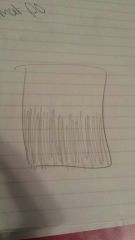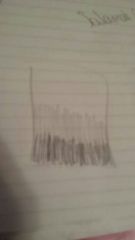![]()
![]()
![]()
Use LEFT and RIGHT arrow keys to navigate between flashcards;
Use UP and DOWN arrow keys to flip the card;
H to show hint;
A reads text to speech;
36 Cards in this Set
- Front
- Back
|
chemistry
|
The study of the composition, structure, and properties of matter, as well as the changes it undergoes
|
|
|
chemical
|
Any substance that has a definite composition
|
|
|
organic chemistry
|
carbon containing compounds
|
|
|
inorganic chemistry*
|
non-carbon compounds
|
|
|
physical chemistry
|
relationship between matter and energy
|
|
|
analytical chemistry
|
composition of materials
|
|
|
biochemistry
|
occurring in living things
|
|
|
theoretical chemistry
|
uses math and computers to understand principles of chemical behavior; may also design new compounds
|
|
|
basic research
|
increases general knowledge
|
|
|
applied research
|
solves a problem
|
|
|
technological development
|
creates products that improve quality of life
|
|
|
matter
|
anything that has mass and takes up space
|
|
|
mass
|
-a measure of the amount of matter present
-measured on electronic balance |
|
|
pure substance
|
made of only one substance and have uniform composition (same characteristics and properties)
|
|
|
mixtures
|
blend of two or more kinds of matter (each retains its identity and property)
|
|
|
element
|
-PURE SUBSTANCE which cannot be broken down by ordinary chemical means
-made of atoms |
|
|
atoms
|
smallest unit of an element that maintains the properties of the element
|
|
|
compound
|
-PURE SUBSTANCE made of two or more types of elements bonded together
|
|
|
homogeneous MIXTURE
|

uniform composition (solutions)
|
|
|
heterogeneous MIXTURE
|

has visibly different parts (suspension)
|
|
|
extensive property
|
-depends on amount of matter present
-volume, mass, energy |
|
|
intensive property
|
-does NOT depend on amount of matter present
-boiling point, melting point, density, conducting heat/electricity |
|
|
physical properties
|
-can be observed or measured with out the changing the identity of substance
-boiling point, melting point |
|
|
chemical property
|
-substances ability to transform into a different substance
-carbon burns, iron rusts, silver tarnishes |
|
|
physical change
|
a change in substance that does NOT change its identity
|
|
|
solid
|
Definite volume and shape
|
|
|
liquid
|
Definite volume but shape changes
|
|
|
gas
|
No definite volume or shape
|
|
|
plasma
|
high temperature state in which atoms lose their electrons
|
|
|
chemical change
|
One or more substances are converted into different substances
|
|
|
reactants
|
substances that react
|
|
|
products
|
substances that are being made
|
|
|
metals
|
-Shiney solids, conduct heat and electricity, malleable, ductile
|
|
|
semi-metals (mellatoids)
|
Have some characteristics of metals and non metals
|
|
|
non metals
|
poor conductors of heat and electricity, can be gases, liquids, or brittle solids
|
|
|
Noble gases
|
inert or unreactive gases
|

